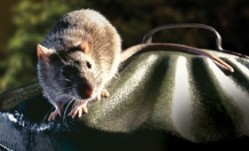Britain's rat population to rise by 20% this winter

Rentokil Pest Control has warned hospitality businesses to take precautions ahead of an expected rise in Britain’s rat population this winter.
Data from The National Pest Technicians Association predicts numbers will increase by 20 per cent in the coming months, which according to Rentokil is down to infrequent rubbish collection and the proliferation of vacated buildings due to the recession.
Rats nest indoors during periods of colder weather and can reproduce up to 200 offspring in their short lifetime, which can be up to one year. With the capability to gnaw through cables, doors and even steel, rats can cause damage to businesses’ stock and buildings.
Savvas Othon, technical director of Rentokil Pest Control, said: “Businesses need to make sure their properties are ‘rodent proof’, remembering any small gap – even the size of a ball point pen – can provide easy access for rats and mice looking for a home during the winter.”
Contamination is also an issue, a rodent’s urine-soaked fur can transmit disease to floors and surfaces and can easily infect food.
Rentokil advise businesses serving or selling food to be particularly vigilant, or risk jeopardising their Scores On the Doors food hygiene rating, which can be accessed by the public online.
They suggest looking for rat or mouse droppings; damaged stock or walls; nesting material – including cardboard, plastics and shredded insulation; and grease marks left by rodent’s bodies as signs of infestation.
Rentokil's top tips to prevent a rodent infestation:
1. Thorough, regular cleaning is vital
2. Crates and boxes should be stacked away from the wall to ensure you can check what’s behind them
3. Set up a contractual relationship with a pest controller, rather than hiring on a reactive basis, to ensure there is no risk of recurring infestations
4. Staff need to be educated on the risks of infestation
5. If a pest is spotted on your premises seek professional advice immediately
6. Empty buildings should be inspected regularly to look for signs of rodent activity
7. Seal up holes in buildings
8. Ensure refuse is kept in closed bins
9. Ensure all pipe-work is in good working order
10. Look after your drains, clean them regularly and unblock gutters and water gullies





















